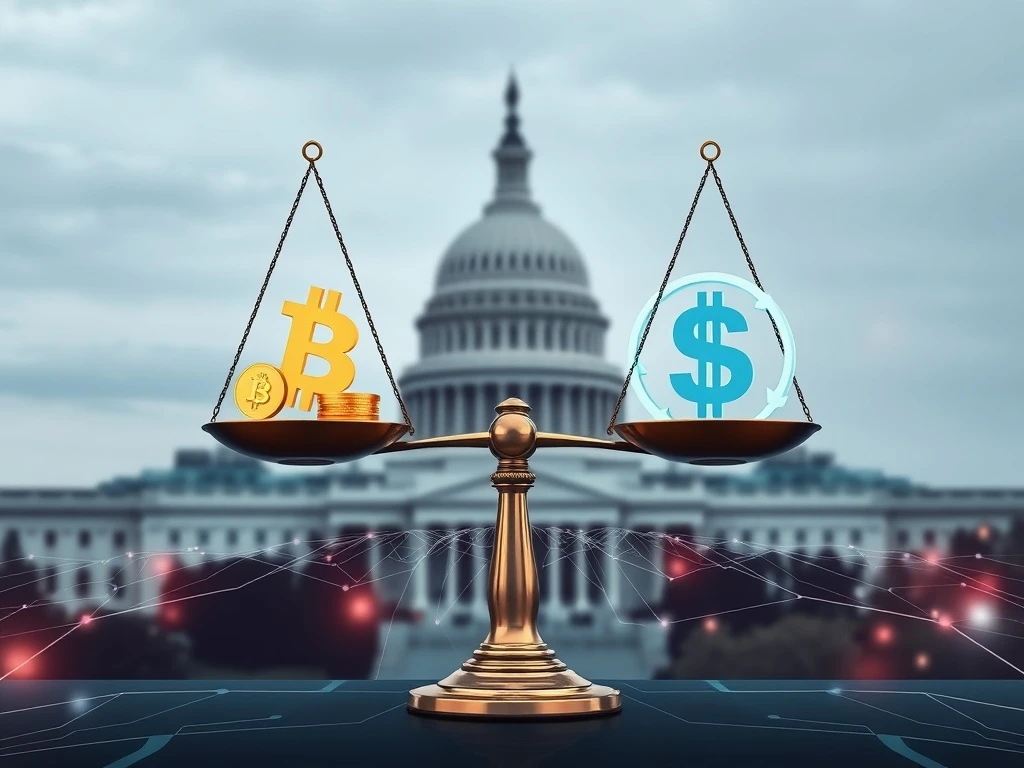Urgent Crypto Update: SEC Eyes Innovation, Fnality Secures Funding, and a Push for Crypto in Retirement Plans

Today’s cryptocurrency market brings pivotal developments. Investors, regulators, and innovators are navigating a rapidly evolving landscape. This comprehensive update details key events impacting Bitcoin, blockchain, DeFi, NFTs, Web3, and critical crypto regulation. Understanding these shifts is essential for anyone engaged with digital assets.
SEC Paves Way for Digital Asset Products with Innovation Exemption
The United States Securities and Exchange Commission (SEC) is actively working on an “innovation exemption.” This significant move aims to streamline the approval process for digital asset products. SEC Chair Paul Atkins revealed this plan on Tuesday during an interview with Maria Bartiromo on Fox Business. Atkins stated the SEC is focused on “rulemaking in the coming months.” The goal is to implement this exemption by the end of the year.
An “innovation exemption” acts as a crucial regulatory carve-out. It provides temporary relief to crypto companies from older securities rules. Consequently, firms can launch new products under lighter oversight. This allows the SEC to develop more tailored regulations for the unique characteristics of digital assets. Atkins also addressed the recent approval of the first multi-asset crypto exchange-traded product (ETP) in the U.S. This product, launched last Friday, offers investors exposure to Bitcoin (BTC), Ether (ETH), XRP (XRP), Solana (SOL), and Cardano (ADA).
The Grayscale crypto fund debuted under the SEC’s recently announced generic listing standards. These standards effectively reduce approval timelines for ETFs under Rule 6c-11. Atkins noted, “It’s not just an ad hoc type of approach. We’re trying to give the marketplace some kind of stable platform upon which they can introduce new products.” This proactive stance signals a potentially more accommodating environment for innovation in the digital asset space.
SEC Chair Paul Atkins speaking on Fox Business on Tuesday. Source: Fox Business
Fnality Secures Major Funding for Blockchain Payments Expansion
London-based blockchain payments company Fnality has successfully closed a significant Series C funding round. The firm secured an impressive $136 million. Some of the world’s largest financial institutions led this investment. Bank of America, Citi, KBC Group, Temasek, Tradeweb, and WisdomTree spearheaded the round. Moreover, existing investors like Goldman Sachs, Santander, Barclays, and UBS also participated, according to a Tuesday announcement.
Fnality CEO Michelle Neal emphasized the importance of this funding. She stated, “The closing of our Series C reflects a shared conviction that the future of money demands a new foundation.” Neal highlighted the company’s blockchain-based settlement systems. These systems offer “24/7 payment rails, real-time settlement, and enhanced liquidity.” This technology fundamentally modernizes wholesale payments. It uses a blockchain-based infrastructure directly tied to central bank reserves.
Fnality launched its sterling-denominated Fnality Payment System in the United Kingdom last year. The new capital will enable the company to expand its operations into the US dollar and euro markets. However, these expansions remain pending necessary regulatory approvals. This substantial investment from major banks underscores growing institutional confidence in blockchain payments technology and its potential to revolutionize global financial infrastructure.
Fnality raises $136 million. Source: Fnality
US Lawmakers Push for Crypto in Retirement Plans
A group of US lawmakers is advocating for increased accessibility of cryptocurrencies in retirement plans. They have urged Securities and Exchange Commission Chair Paul Atkins to expedite an executive order. This order aims to enable crypto investments in US 401(k) retirement plans. On Monday, nine lawmakers, including House Financial Services Committee Chairman French Hill and Subcommittee on Capital Markets Chairman Ann Wagner, sent a letter to Atkins. They requested his “swift assistance” to the Secretary of Labor.
The lawmakers also asked Atkins to make any necessary adjustments to current regulations and guidance. They referenced President Donald Trump’s August executive order on “Democratizing Access to Alternative Assets for 401(k) Investors.” This order specifically instructed the SEC to make alternative assets, including crypto, more accessible in participant-directed retirement plans. These considerations would align with accredited investor and qualified purchaser rules. Consequently, this initiative could significantly broaden investment options for millions of Americans.
The letter expressed hope that these actions would benefit the “90 million Americans that are currently restricted from investing in alternative assets.” This would help them “secure a dignified, comfortable retirement.” Expanding access to crypto in retirement plans could represent a major step towards mainstream adoption of digital assets. It also highlights ongoing efforts to update financial regulations for the digital age, directly addressing the need for modernized crypto regulation.
US lawmakers’ letter to SEC Chair Paul Atkins. Source: French Hill
Broader Implications for the Crypto Market and Future Outlook
These developments collectively paint a picture of a cryptocurrency market undergoing significant transformation. The SEC’s exploration of an SEC innovation exemption signals a shift towards a more nuanced regulatory approach. This could foster greater innovation while still providing investor protection. Companies developing new digital asset products stand to benefit immensely from clearer, more efficient pathways to market.
Furthermore, the substantial investment in Fnality by major banks underscores the growing integration of blockchain technology into traditional finance. This validates the utility of blockchain payments beyond speculative trading. It points to a future where digital ledger technology underpins core financial services. This institutional backing is a powerful indicator of maturity for the entire crypto ecosystem.
Finally, the legislative push for crypto in retirement plans represents a crucial step towards democratizing access to digital assets. If successful, this initiative could unlock vast capital flows into the crypto market. It would also empower individual investors with more diverse options for long-term wealth building. These combined efforts from regulators, institutions, and lawmakers indicate a maturing industry. The future of digital assets appears increasingly intertwined with established financial systems, driven by innovation and a push for broader inclusion.







